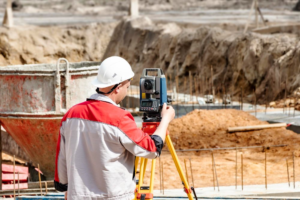
Land surveying is a crucial discipline in the construction industry, providing the foundational measurements and data necessary for the successful execution of construction projects. From initial site assessments to final inspections, accurate land surveying ensures that projects comply with regulatory standards and are executed within the defined parameters. This article explores the vital role of land surveying in construction projects, emphasizing its impact on accuracy and compliance.
Understanding Land Surveying
Land surveying involves the precise measurement of land and its features to determine spatial relationships and boundaries. Surveyors utilize a variety of tools and techniques to gather data about the topography, boundaries, and features of a site. This information is critical for the planning and design phases of construction projects, as it provides a detailed understanding of the land’s characteristics and constraints.
The Importance of Accurate Measurements
Accurate measurements are fundamental to the success of any construction project. Errors in measurements can lead to significant issues, including structural problems, legal disputes, and increased costs. Land surveying provides the precision needed to create accurate site plans and ensure that construction adheres to design specifications. By using advanced technology such as GPS and total stations, surveyors can achieve high levels of accuracy in their measurements.
Compliance with Regulatory Standards
Construction projects must comply with a range of regulatory standards and zoning laws. Land surveying plays a crucial role in ensuring that projects adhere to these regulations. Surveyors verify that construction plans align with local zoning laws, building codes, and environmental regulations. This includes confirming setbacks, easements, and property boundaries to avoid legal conflicts and ensure that the construction meets all necessary standards.
Site Analysis and Planning
Before construction begins, a comprehensive site analysis is essential. Land surveying provides the data needed to assess the suitability of a site for the intended construction. This analysis includes evaluating the topography, soil conditions, and existing structures. Surveyors identify any potential issues that could impact the project, such as unstable soil or nearby water sources. This information is crucial for designing a project that is both feasible and safe.
Design and Engineering Integration
Land surveying data is integral to the design and engineering processes. Surveyors provide architects and engineers with detailed site plans that serve as a basis for designing the project’s layout and infrastructure. Accurate land surveying ensures that design plans align with the actual site conditions, preventing discrepancies that could lead to costly modifications during construction.
Monitoring and Quality Control
During construction, ongoing land surveying is essential for monitoring progress and maintaining quality control. Surveyors regularly check the alignment and positioning of structures to ensure they meet design specifications. This continuous monitoring helps identify and address any deviations from the plan, preventing potential issues before they become major problems.
Dispute Resolution
Disputes over property boundaries and construction encroachments can arise during and after construction projects. Land surveying provides clear and accurate documentation of property lines and site conditions, which can be used to resolve disputes. Having precise survey data helps in legal proceedings and negotiations, reducing the likelihood of prolonged conflicts.
The Impact of Technology on Land Surveying
Advancements in technology have significantly enhanced the capabilities of land surveying. Modern tools such as laser scanning, drone surveys, and 3D modeling provide more accurate and detailed data than traditional methods. These technologies improve the efficiency of land surveying and offer new possibilities for data analysis and visualization. By leveraging these innovations, surveyors can deliver more precise and comprehensive information to support construction projects.
Conclusion
Land surveying is an indispensable component of construction projects, ensuring that they are executed with accuracy and compliance. From initial site assessments to ongoing monitoring, accurate land surveying provides the data needed for successful project planning, design, and execution. By adhering to regulatory standards and utilizing advanced technology, land surveyors play a crucial role in delivering projects that meet both technical and legal requirements. As construction projects continue to grow in complexity, the importance of land surveying in maintaining accuracy and compliance will only increase.